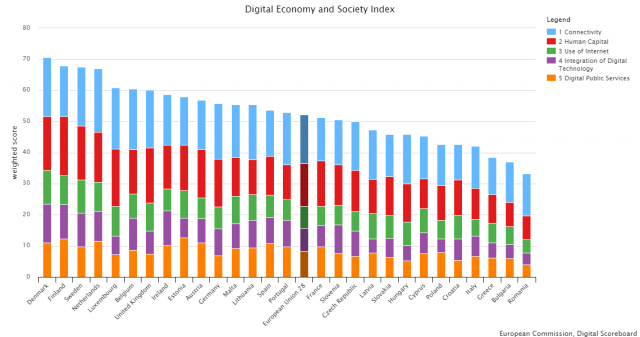 Denmark, Finland, Sweden and the Netherlands have the most advanced digital economies in the EU followed by Luxembourg, Belgium, the UK and Ireland, while Romania, Bulgaria, Greece and Italy are at the bottom of the latest European Digital Economy and Society Index (DESI).
Denmark, Finland, Sweden and the Netherlands have the most advanced digital economies in the EU followed by Luxembourg, Belgium, the UK and Ireland, while Romania, Bulgaria, Greece and Italy are at the bottom of the latest European Digital Economy and Society Index (DESI).
DESI is a composite index that summarizes how well European states are performing in the 21st century digital/knowledge economy and how well they are evolving in digital competitiveness. The index helps countries track the likelihood of their success in the global market, and gives countries relative goals they should achieve to be ready to compete with North America and Asia.
In 2016, every EU Member State improved on the DESI, with Slovakia and Slovenia turning it the biggest growth. However, growth was so slight in Portugal, Latvia, and Germany it appeared almost static.
In general, the best scoring nations also scored highly in all the categories measured in the DESI: Connectivity, Human Capital/Digital Skills, Citizen Use of the Internet, Business Digital Technology Integration, and Digital Public Services.
In terms of internet connectivity scores which track broadband deployment and quality, the Netherlands scored highest in 2016 followed by Luxembourg and Belgium. The weakest EU performers were Croatia, Bulgaria, and Poland. Europe has made better inroads in guaranteeing access to broadband, with 98% of Europeans able to access at least one provider. About 76% of Europeans can today choose high-speed broadband at speeds of at least 30Mbps.
Wireless 4G mobile networks cover on average 84% of the EU’s population (measured as the average of each mobile telecom operator’s coverage within each country). At least 74% of European homes subscribe to wired broadband, and over one-third of these connections are high-speed. The number of high-speed connections went up by 74% in two years.
Having a skilled population comfortable with the digital economy and knowledgeable enough to navigate it are also important for commerce, education, and employment. Denmark, Luxembourg, Finland, Sweden, and the Netherlands scored the highest in 2016, while Romania, Bulgaria, Greece and Italy got the lowest scores.
Europeans still do not spend as much time on the internet as their American and Asian counterparts. Last year, 79% of Europeans went online at least once a week, up 3 points compared to 2015. But 44% of Europeans still lack basic digital skills. The most popular online activity in Europe is reading news online (70%), followed by online shopping (66%), social media (63%), and online banking (59%).


 Subscribe
Subscribe